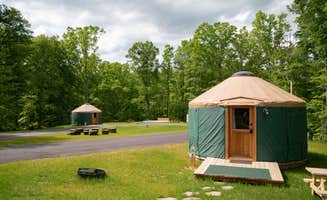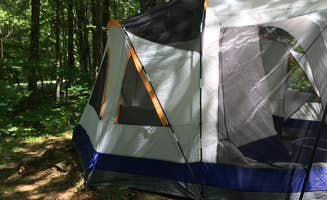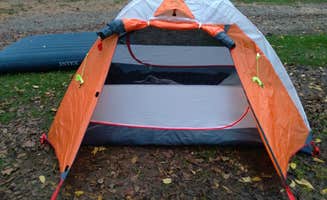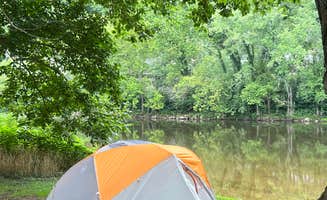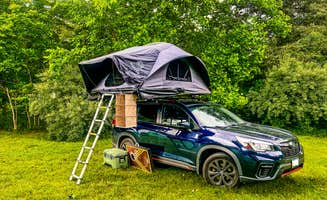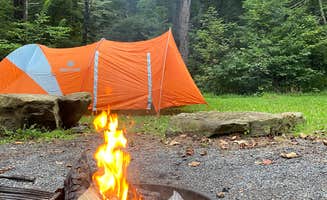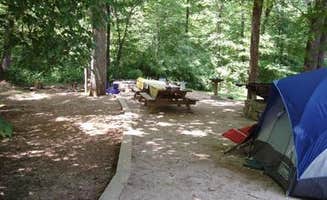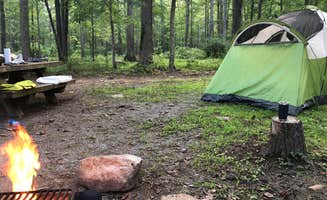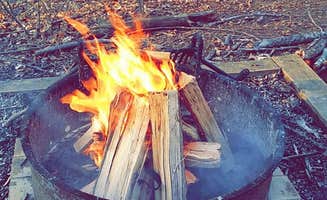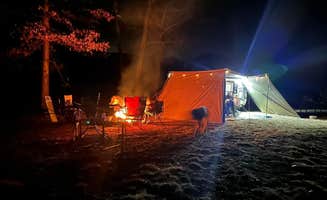Dispersed camping near Blue Ridge, Virginia ranges from basic sites to cabins with amenities. The area sits between 1,000 and 3,900 feet elevation with temperatures averaging 10-15 degrees cooler than surrounding lowlands. The George Washington and Jefferson National Forests provide numerous camping options along creek beds and forest roads that aren't covered by Blue Ridge Parkway campgrounds.
What to do
Creek exploration: Bring water shoes to wade in the streams at Cave Mountain Lake Group Camp. "The little streams running near each site, the beautiful walk to the lake with the leopard salamanders that the kids could catch and swim in," notes Gloria G. The creek winds through the main loop providing ambient sound and splash opportunities.
Cavern tours: Book morning slots at Dixie Caverns for a unique underground experience. "The caverns are worth visiting pretty cool cave system. We got in late in the afternoon after the last tour woke up early and caught the first tour before heading on our way," reports Shane T. Campers receive discounted tour rates when staying on property.
Mountain hiking: Pack trekking poles for steep terrain on nearby trails. "Sharp top and flat top hikes. Both were beautiful, but slightly difficult so just be prepared. Also bring bug spray because the flies were terrible at the top," advises Sam M. from Peaks of Otter Campground. Trails connect to major systems including the Appalachian Trail within short driving distances.
What campers like
Forest immersion: Sites carved into hillsides at Peaks Of Otter Campground provide unique camping environments. "The whole campground is kind of 'carved' out of the mountain, and is therefore quite terraced in appearance, so a lot of sites had a similar setup to ours," explains Jen V. This design creates tiered camping areas with natural separation between sites.
Year-round options: Winter camping available at limited locations. "One of the few campgrounds open during the winter with facilities," notes Stephen D. about Don's Cab-Inns Campground. While most Blue Ridge area campgrounds close October through April, several private campgrounds remain operational through winter months.
Lake access: Swimming opportunities away from crowds. "Just the drive to the campground through the Blue Ridge Mountains was beautiful. Some of us spent all day swimming, catching salamanders and tadpoles while some of us fished," shares Maggie A. about Cave Mountain Lake. Most lakes in the region provide beach areas for day use alongside camping.
What you should know
Wildlife awareness: Bear protocols required at mountain campsites. "Be sure to read the bear recommendations and pack up your site accordingly and you'll have a wonderful time," advises Gloria G. about Cave Mountain Lake. Food storage lockers are available at some campgrounds but often shared between multiple sites.
Weather preparedness: Mountain conditions change rapidly with elevation differences of 1,000+ feet between camping areas. "Weather can be cool even in July," notes Heather E. about camping at Peaks of Otter, where wildflowers bloom but temperatures drop significantly at night.
Limited connectivity: Cell service spotty throughout most camping areas. "Poor cell reception, no tv. A forced off the grid experience," explains Shawn at Middle Creek Campground. Prepare for limited or no internet access, especially at National Forest campgrounds and higher elevations.
Tips for camping with families
Site selection: Book creek-adjacent spots for natural entertainment. "Our boys loved playing in the stream and climbing the hill to get to our hammock on the site too," shares Lanie B. about Cave Mountain Lake. Sites along creeks provide both ambient sound and built-in water play areas.
Winter visits: Book cabins for cold-weather comfort at Smith Mountain Lake State Park. "Winter camping options are limited," but Smith Mountain Lake operates year-round with heated accommodations and maintains shower facilities even in winter months.
Swimming alternatives: Check for slides and water features at campgrounds with lakes. "They had a fishing pond, lake to swim in with fun inflatable slides and trampoline and a pool. We made use of all them during our stay. The lake was super fun and such a cool idea to have the slides and trampolines," explains Amanda about Middle Creek Campground.
Tips from RVers
Site leveling challenges: Bring blocks for uneven mountain terrain. "The sites and tent pads were pretty small," notes Lisa M. about camping at Peaks of Otter. Many mountainside campgrounds feature sloped sites requiring additional equipment to level larger rigs.
Limited hookup availability: Research carefully before arrival as many Blue Ridge area campgrounds offer partial or no hookups. "All new facilities and only $25 a night. Electric on the site, water and dump station located nearby," reports Terry F. about Don's Cab-Inns Campground.
Size restrictions: Measure carefully as mountain campsites often have length limitations. "Very territorial deer, will stalk you on way to dumpster!" warns Karen W. about wildlife at Peaks of Otter, where sites accommodate limited-size vehicles due to mountainside terracing.


